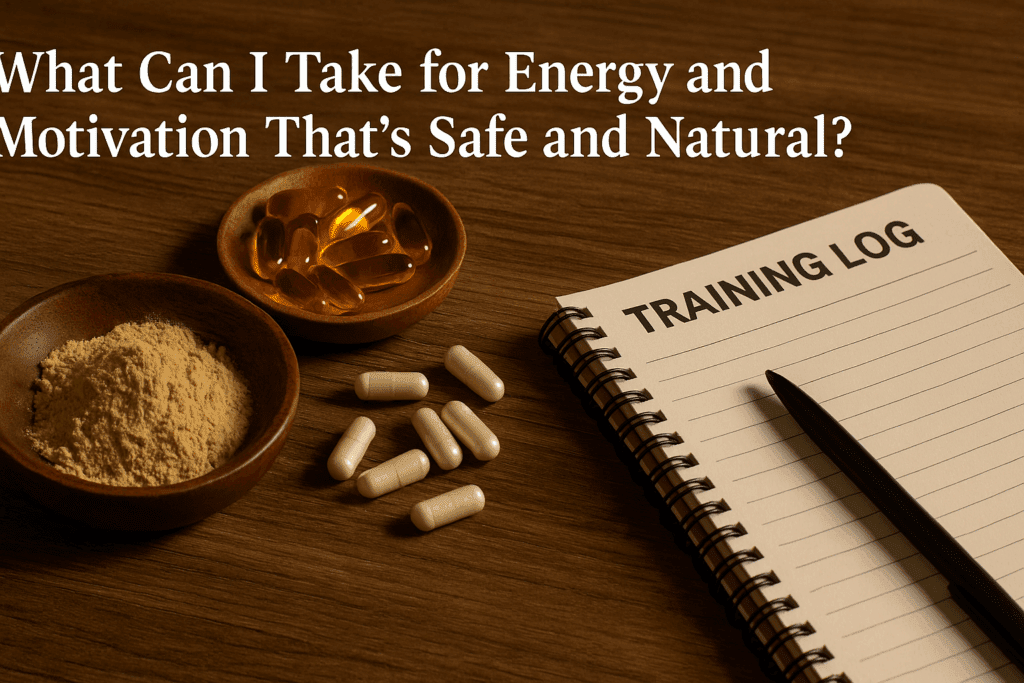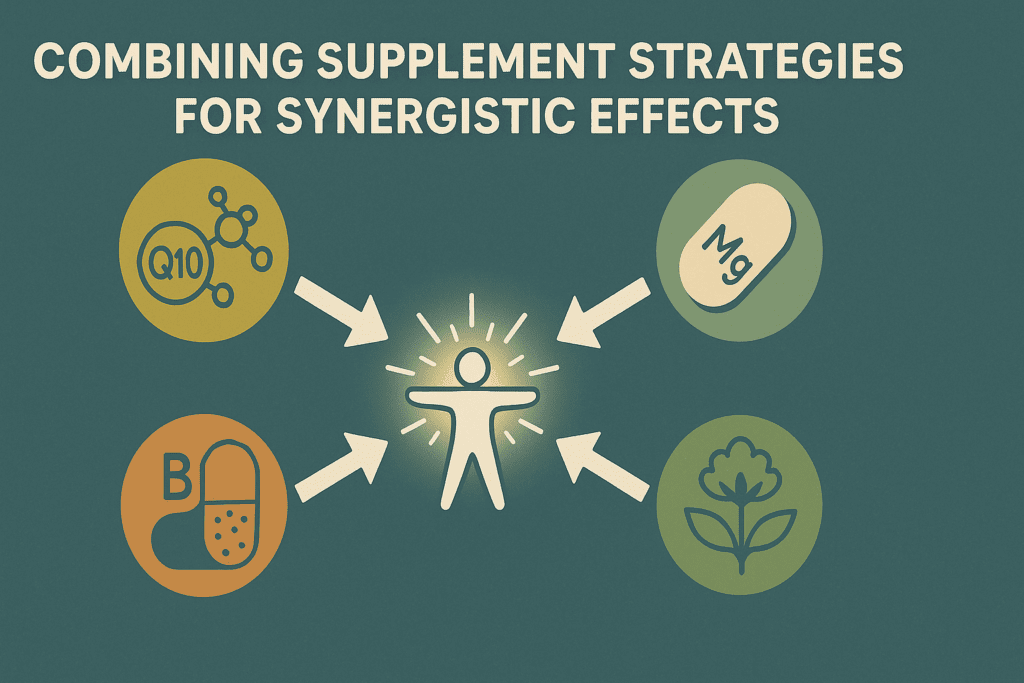Endurance training demands not only physical strength but also a high level of sustained mental focus and energy. Whether you’re an experienced athlete, a committed runner, or a weekend warrior training for your next long-distance event, the challenge lies in maintaining consistent performance over time. With the increasing interest in natural approaches to wellness and performance enhancement, many individuals are asking: what can I take for energy and motivation that aligns with a health-conscious lifestyle? This article explores that question with depth, combining scientific insights, real-world examples, and expert-level guidance.
As the popularity of holistic health grows, so does interest in energy enhancement supplements and great vitamins for energy that may support both physical output and cognitive drive. This surge in awareness is not just a trend but a reflection of a broader cultural shift toward optimizing natural solutions that integrate well with rigorous training schedules. But which options are both effective and safe? And how do we distinguish marketing hype from science-backed support? This article addresses those questions in a detailed yet accessible manner, helping you make informed choices that boost your performance naturally and sustainably.
You may also like: Build Strength that Lasts: Best Supplements for Stamina and Endurance Backed by Science

The Physiology of Endurance and Energy Needs
Endurance exercise significantly taxes the body’s energy systems. As training sessions extend in time and intensity, glycogen stores become depleted, mitochondrial function is challenged, and oxidative stress can increase. For sustained effort, the body requires a stable and efficient supply of adenosine triphosphate (ATP), the energy currency of cells. This is especially important in aerobic training where fat and carbohydrates are utilized for prolonged energy output.
Moreover, endurance performance isn’t solely about muscle mechanics. Mental stamina plays a pivotal role. The neurochemical balance of the brain—particularly levels of dopamine, serotonin, and norepinephrine—can influence perception of fatigue, motivation, and emotional resilience. Athletes often describe “hitting the wall,” a phenomenon where both physical and mental resources seem to crash simultaneously. In this context, enhancing energy isn’t just about refueling the body; it’s about revitalizing the mind as well.
Understanding this dual need for physical and cognitive energy underscores the relevance of seeking targeted support. Many athletes, students, and professionals turn to energy enhancement supplements for this very reason. These products often combine ingredients that influence both metabolism and neurotransmitter activity, aiming to improve performance outcomes in a balanced, non-jittery way.

Understanding Energy Enhancement Supplements: What Works and Why
The category of energy enhancement supplements is broad, but not all products within it are created equal. Some are stimulatory in nature, offering short bursts of energy through compounds like caffeine or synephrine. Others are adaptogenic, aiming to enhance the body’s resilience to stress and support sustainable energy levels over time. To choose wisely, it’s important to understand the science behind key ingredients.
Caffeine remains the most well-studied energy enhancer, shown to improve endurance by increasing adrenaline, mobilizing fat stores, and reducing perceived exertion. However, many individuals experience drawbacks such as jitteriness, energy crashes, or disrupted sleep. When used, caffeine is most effective in moderate doses of around 3–6 mg/kg of body weight taken 30–60 minutes before endurance activity.
More nuanced support can be found in ingredients like Rhodiola rosea and Panax ginseng, both of which are adaptogens that help the body manage physical and emotional stress. These herbs have demonstrated potential in improving mental clarity, reducing fatigue, and enhancing recovery without the harsh effects of synthetic stimulants. They are particularly helpful for individuals asking what can I take for energy and motivation without experiencing overstimulation.
Another promising category includes mitochondrial support nutrients like Coenzyme Q10 (CoQ10), L-carnitine, and alpha-lipoic acid. These compounds support the cell’s powerhouses—mitochondria—in producing ATP more efficiently, which may translate into improved endurance capacity and faster recovery. Because endurance training places a heavy metabolic demand on cells, protecting and fueling mitochondria can have significant performance benefits.

What Can I Take for Energy and Motivation That’s Safe and Natural?
For many athletes and wellness seekers, the goal is not just to feel energized but to do so in a way that aligns with long-term health. Natural solutions tend to offer a more sustainable approach. The question, what can I take for energy and motivation, frequently leads to exploration of herbal formulas, amino acids, and micronutrients.
Tyrosine, an amino acid that supports the synthesis of dopamine and norepinephrine, is one such compound. These neurotransmitters are involved in alertness, focus, and motivation. Studies have shown that tyrosine supplementation may help maintain cognitive performance under stress or fatigue, making it valuable during high-volume training weeks or long endurance events.
B-complex vitamins are also essential, especially for those looking for great vitamins for energy. These nutrients act as co-factors in energy metabolism, aiding in the breakdown of carbohydrates and fats into usable energy. Deficiencies in B vitamins, particularly B6, B9 (folate), and B12, are associated with fatigue, poor concentration, and decreased exercise tolerance. Supplementing with a well-rounded B-complex can help correct deficiencies and support optimal energy production.
Natural sources such as maca root have also gained traction for their reputed ability to enhance stamina, libido, and general vitality. While research is still emerging, early studies suggest that maca may improve mood and endurance performance in both animal models and human trials. Its adaptogenic properties make it another viable option for those looking to maintain high energy and motivation during training cycles.

Great Vitamins for Energy: Micronutrients that Matter
Micronutrients are often overlooked in discussions about performance enhancement, yet they are critical to the body’s ability to generate and sustain energy. Vitamins and minerals act as catalysts for enzymatic reactions that support everything from oxygen transport to muscle contraction. Among the great vitamins for energy, the B-vitamin family stands out, but it’s not the only contributor.
Vitamin D, for instance, plays a crucial role in muscle function, inflammation modulation, and even mood regulation. Low vitamin D levels have been associated with decreased athletic performance and increased injury risk. Because vitamin D is synthesized in the skin via sun exposure, individuals who train indoors or live in northern latitudes may require supplementation, particularly during the winter months.
Iron is another essential mineral, particularly for endurance athletes. It is necessary for the formation of hemoglobin, which transports oxygen in the blood. Low iron levels can result in fatigue, weakness, and decreased aerobic capacity. Female athletes, in particular, are at higher risk for iron deficiency due to menstruation and should monitor their iron status regularly.
Magnesium deserves mention as well, as it supports hundreds of enzymatic reactions, including those related to ATP production, muscle relaxation, and nerve transmission. Athletes often have higher magnesium requirements due to losses through sweat and increased metabolic activity. A deficiency can contribute to muscle cramps, fatigue, and even poor sleep—all of which undermine performance and recovery.

Holistic Lifestyle Factors That Enhance Energy and Endurance
Supplements can certainly provide support, but they are most effective when used in conjunction with smart lifestyle choices. Nutrition, sleep, stress management, and training periodization all influence energy levels and motivation. A balanced diet rich in whole foods provides the raw materials the body needs to function optimally. Carbohydrates replenish glycogen, protein aids muscle repair, and healthy fats support hormone production.
Sleep is perhaps the most underrated performance enhancer. Inadequate rest impairs not only physical performance but also mood, concentration, and motivation. Deep, restorative sleep allows for proper recovery of both the body and brain. Athletes should aim for 7–9 hours of quality sleep per night and prioritize consistency in their sleep schedule.
Stress management is equally important. Chronic stress increases cortisol, which can deplete energy reserves, impair immune function, and reduce motivation. Techniques like mindfulness meditation, deep breathing exercises, and yoga can help manage stress and improve mental resilience. These practices are particularly helpful when integrated into daily routines alongside physical training.
Training strategies also matter. Overtraining without adequate rest can lead to burnout, decreased motivation, and performance plateaus. Periodization—structuring training cycles to include varying intensities and recovery weeks—can prevent overuse injuries and maintain enthusiasm. Listening to your body and adjusting based on fatigue levels is a hallmark of sustainable endurance training.

Combining Supplement Strategies for Synergistic Effects
Rather than relying on a single supplement, many athletes benefit from a targeted combination tailored to their individual needs and training demands. For example, combining a B-complex with CoQ10 and magnesium may support mitochondrial energy production while addressing common nutrient deficiencies. Similarly, adding Rhodiola and maca can provide adaptogenic support to buffer against mental and physical fatigue.
This approach requires a degree of self-awareness and, ideally, input from a healthcare professional or sports nutritionist. Personalized supplementation ensures that dosages are appropriate and that there are no contraindications with other medications or conditions. This reinforces the principles of EEAT—Experience, Expertise, Authoritativeness, and Trustworthiness—ensuring that any performance strategy is safe, evidence-based, and tailored to the individual.
Those exploring energy enhancement supplements should also be mindful of product quality. Third-party testing, transparent labeling, and reputable sourcing are key indicators of a trustworthy supplement. Look for certifications such as NSF Certified for Sport or Informed-Choice, which verify that products are free from banned substances and contaminants.
Frequently Asked Questions: Energy and Motivation During Endurance Training
1. Are there specific times of day when energy enhancement supplements are most effective? Yes, the timing of energy enhancement supplements can influence their effectiveness. For example, adaptogens like Rhodiola rosea tend to perform best when taken earlier in the day, as they can support mental clarity and reduce fatigue throughout working hours or training blocks. On the other hand, if you’re relying on stimulant-based energy formulas, such as those containing caffeine, taking them too late in the day can disrupt sleep cycles. It’s important to align supplement timing with your training schedule—ideally 30 to 60 minutes before your workout for optimal absorption and physiological effect. Understanding your circadian rhythm can also help in choosing what can I take for energy and motivation to coincide with your body’s natural energy dips.
2. How do energy enhancement supplements compare to nootropics for mental stamina? While both categories aim to improve performance, they target different aspects of cognition and physical capacity. Energy enhancement supplements generally support physical endurance and metabolic processes, whereas nootropics focus more narrowly on brain function, including memory, focus, and learning. However, there is some overlap—ingredients like L-theanine, tyrosine, and even certain B vitamins are often found in both types of formulas. Choosing great vitamins for energy that support both cognitive and physical function can help bridge the gap between the two categories. If your motivation tends to wane mentally rather than physically, a nootropic blend may offer more targeted results, especially when paired with traditional endurance support.
3. Can psychological factors impact the effectiveness of energy supplements? Absolutely. Your mental state plays a significant role in how well energy enhancement supplements work. For instance, a person struggling with chronic stress or emotional fatigue may not respond as robustly to supplementation unless those underlying factors are addressed. When asking what can I take for energy and motivation, it’s also critical to consider emotional and psychological inputs like goal clarity, training satisfaction, and self-efficacy. Supplements can offer a physiological foundation, but sustainable motivation often depends on intrinsic factors and cognitive reframing. Journaling, visualization, and supportive coaching relationships can greatly amplify the benefits of physical supplements.
4. Are there energy enhancement strategies specifically designed for plant-based athletes? Yes, plant-based athletes may have unique nutritional needs, especially regarding bioavailability and absorption of key nutrients. Many great vitamins for energy—including B12, iron, and zinc—are more difficult to obtain in adequate amounts from a vegan or vegetarian diet. Supplementation becomes particularly important when training volume is high, and energy demands are elevated. Fortunately, there are many plant-based energy enhancement supplements now available that incorporate adaptogens, fermented vitamins, and methylated B-complexes to improve efficacy. Being mindful of nutrient timing and digestive health can further enhance outcomes in plant-based endurance routines.
5. What’s the risk of dependency on energy enhancement supplements? Although most natural energy supplements are not inherently addictive, psychological dependency can occur when users rely on them excessively to perform or feel motivated. This is especially true for stimulant-heavy products. People asking what can I take for energy and motivation should understand the importance of cycling off certain supplements to assess their baseline energy and mental focus. A sustainable approach involves periodically evaluating your habits, goals, and physical cues. Incorporating restorative practices like active recovery, mental coaching, and nutrient-rich whole foods ensures you’re not leaning on supplements as a crutch.
6. How do energy supplements interact with hydration strategies during endurance training? Proper hydration plays a synergistic role with energy enhancement supplements. Dehydration can blunt the efficacy of even the best formulas by reducing nutrient absorption and compromising cardiovascular efficiency. Some ingredients in energy enhancement supplements, such as creatine or beta-alanine, may increase the body’s need for water. In hot or high-altitude training environments, electrolyte balance becomes even more critical. Integrating supplements into a broader hydration strategy—including electrolyte-rich beverages and real-time sweat loss tracking—can significantly boost performance.
7. Can chronic fatigue syndrome (CFS) or adrenal fatigue affect response to supplements? Yes, individuals experiencing chronic fatigue or hormonal dysregulation may respond differently to energy supplementation. For these individuals, it’s not just about what can I take for energy and motivation, but rather how to repair systemic imbalances that may be draining energy reserves. In such cases, adaptogenic herbs and nutrient therapies should be introduced gradually, under medical supervision, and in tandem with lifestyle interventions. The body’s response may be slower but more meaningful over time. Avoiding stimulants and focusing on root-cause recovery is typically the safer route.
8. Are there any newer or emerging energy enhancement ingredients worth exploring? Emerging compounds like elevATP, PeakATP, and PQQ (pyrroloquinoline quinone) are gaining attention in sports science circles for their ability to support cellular energy production. These ingredients work by enhancing mitochondrial efficiency and boosting ATP levels naturally, offering a more targeted approach compared to traditional energy enhancement supplements. Additionally, mushroom-based ingredients like cordyceps are becoming increasingly popular among endurance athletes for their potential to improve oxygen utilization and stamina. These newer ingredients offer exciting possibilities for those seeking innovative ways to sustain long-term motivation and endurance.
9. How do you measure the real-world impact of energy supplements on motivation? Quantifying motivation is tricky because it’s influenced by both tangible and intangible factors. While energy levels can be tracked using wearables, heart rate variability, or training output, motivation is often best assessed subjectively through journaling, mood tracking apps, and behavioral consistency. Those wondering what can I take for energy and motivation should consider tracking both energy and emotional states over time. Combining this with performance logs offers a fuller picture of what’s working. A dip in motivation despite supplementation may signal overtraining or the need for a mental reset.
10. Can age impact the effectiveness of great vitamins for energy? Age can influence how the body absorbs and utilizes nutrients, making supplement selection even more important over time. Older adults may require higher levels of great vitamins for energy such as B12 and vitamin D due to changes in digestive efficiency and reduced sun exposure. Similarly, mitochondrial function tends to decline with age, which can make CoQ10 and alpha-lipoic acid more relevant for maintaining endurance and daily energy. Age-related hormonal shifts also affect motivation and recovery, which should be taken into account when designing a supplement protocol. Consulting with a health professional who understands age-specific energy needs ensures a more tailored and effective approach.
Conclusion: A Smarter, Safer Path to Endurance and Motivation
For anyone asking what can I take for energy and motivation during endurance training, the answer lies in a holistic, informed approach. From adaptogens like Rhodiola and energy boosters like CoQ10 to great vitamins for energy such as B-complex and vitamin D, the options are plentiful—but they must be chosen with care. The rise in energy enhancement supplements has created both opportunity and confusion, making it vital to distinguish marketing from science and short-term fixes from long-term health.
Real performance enhancement comes from understanding your body’s needs and responding with targeted, sustainable strategies. Whether you’re training for a marathon, juggling professional responsibilities, or simply looking to maintain your edge, the right combination of nutrients, lifestyle choices, and mindset can make all the difference.
In a world saturated with quick fixes and exaggerated claims, prioritizing your health and performance through credible, science-backed strategies is the wisest path forward. When you integrate evidence-based supplements with good sleep, smart training, and balanced nutrition, you build a foundation that not only boosts energy and motivation but also supports endurance for the long haul.
Was this article helpful? Don’t let it stop with you. Share it right now with someone who needs to see it—whether it’s a friend, a colleague, or your whole network. And if staying ahead on this topic matters to you, subscribe to this publication for the most up-to-date information. You’ll get the latest insights delivered straight to you—no searching, no missing out.

